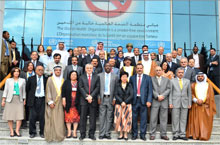 Members of the Regional Committee attended today the opening of the 59th session in the Regional Office
Members of the Regional Committee attended today the opening of the 59th session in the Regional Office
With a heavy agenda full of important health issues, and the features of a new health strategy in the Region, the 59th session of the WHO Regional Committee for the Eastern Mediterranean opened today, Monday 1 October 2012, at the Regional Office for the Eastern Mediterranean, Cairo, with the attendance of their Excellencies Ministers of Health and Dr Margaret Chan, WHO Director-General.
Dr Ala Alwan, WHO Regional Director for the Eastern Mediterranean, in his opening address stated that the current challenges in the Region are alarming and outlined his strategy for the coming five years. He noted that the tremendous movement for change in the Region the root causes of which lie in social inequity
He said that WHO has long expressed concern at the impact of such inequity on people’s health, with poverty, lack of access to education and employment opportunities, and lack of universal social protection against hardships imposed by illness being key determinants of health.
The Regional Director said that what is being done in the Region to overcome the challenges is not sufficient and that the ‘best buys’ to prevent diseases, especially chronic diseases, are not being put in place fast enough or with sufficient commitment. Progress has been made but several countries in the Region still have maternal and child mortality rates that are among the highest in the world. Noncommunicable diseases are now the leading cause of mortality in the Region as a whole, accounting for more than 70% of deaths in some countries.
Dr Alwan referred to the situation in the Syrian Arab Republic stressing that it is of acute concern as access to essential health care for hundreds of thousands of displaced people represents the difference between life and death. Dr Alwan said that More than 160 primary health care clinics are damaged, of which over 40% are out of service and two thirds of 88 hospitals are damaged, while war has prevented WHO from taking the necessary relief measures.
In her speech Dr Chan, who addressed the issue of Polio eradication in detail, warned that failure in eradicating polio could not be not accepted under any circumstances, and that any relaxation in handling this would lead to a setback.
Dr Chan referred to the existence of huge health problems in the Region, threaten both health and economies. Diabetes care, for example, consumes 15% of the overall health budget in some countries of the Region, while out-of-pocket expenditure accounts for 75% of the national health budget in the low-income countries and hurts the poor.
The novel coronavirus imposed itself on the opening speeches during the opening session. The Director-General and Regional Director confirmed that there is no evidence to date that the virus can be transmitted from human to human or can cause any serious outbreaks. They both referred to the fact that the fast detection of the novel coronavirus and high vigilance all over the world demonstrated the ability of the International Health Regulations to improve global health security.
The session was headed by Dr Ahmed Bin Mohamed Al-Saidi, Oman Minister Of Health, and chair of the 58th Session of the Regional Committee. Dr Al-Saidi, in his opening remarks said that the tremendous changes in the Region showed that there is a great difference in the level of response to threats. While some strong points were noted, many weak points need to be strengthened.
During the rest of the first day’s sessions, WHO reform and the Annual Report of the Regional Director were discussed.
Dr Bahr Idris, Minister of Health of Sudan, was elected as the Chair of the 59th session of the Regional Committee. The Ministers of Health of Kuwait and Tunisia were elected as vice chairs, while the Minister of Health of Afghanistan was elected as head of the technical discussions.
Correction: The original version of the speech delivered by the Regional Director on 1 October was misleading in its referral to the proportion of primary health care facilities and hospitals damaged in the Syrian Arab Republic. This has now been corrected. This revised press release reflects the correction.








